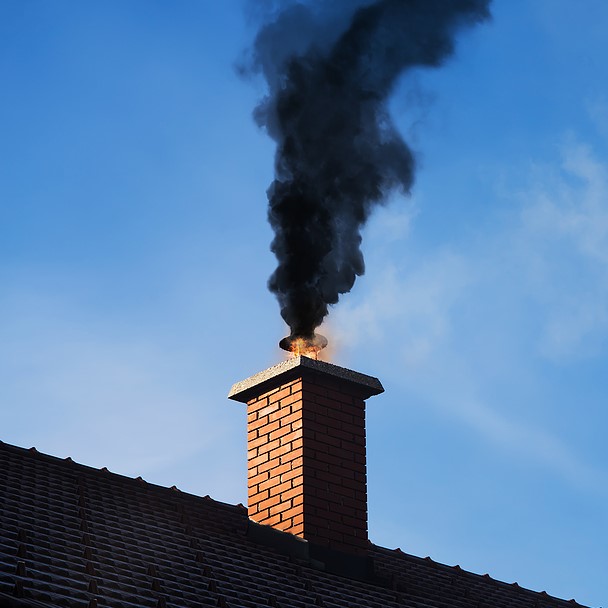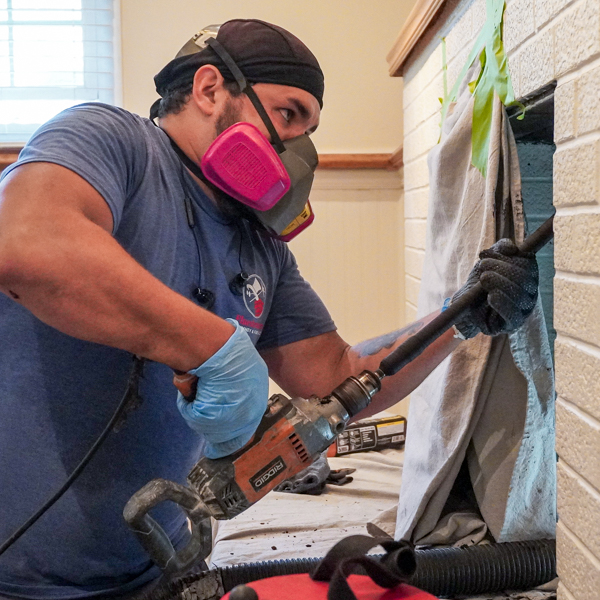Here’s What To Do When There’s a Chimney Fire
 A clean and properly maintained chimney should never have fiery sparks popping out of its top. Unfortunately, not all chimneys are clean and maintained. Fluesbrothers Chimney & Fireplace offers the following advice should you experience this potentially dangerous problem.
A clean and properly maintained chimney should never have fiery sparks popping out of its top. Unfortunately, not all chimneys are clean and maintained. Fluesbrothers Chimney & Fireplace offers the following advice should you experience this potentially dangerous problem.
Call 911
This is the first step, because, although the situation may not seem dire, it could be. Assuming there’s a fire in the chimney, you can’t solve the problem on your own. Bring in trained emergency personnel.
Extinguish the fire in the fireplace
This is the second step – if you can put out the fire safely. If not, move to step 3.
Leave the house
Leave with all people and pets living in the home. If you feel it’s necessary, take with you any valuables that you can’t afford to lose. It probably won’t come to this, but use your judgment.
Why all the panic?
The panic is because, if sparks and embers are coming out of the top of your chimney, an active chimney fire is occurring, even if you don’t see actual flames.
Along with fiery debris exiting the chimney, a chimney fire often gives other signs such as:
- A strange tapping or clicking noise
- A rumbling sound like from a faraway train
- Excess dense smoke coming from the top of the chimney or the fireplace
What causes chimney fires?
By far the most common cause of chimney fires is creosote that ignites in the chimney flue.
Creosote is formed by the condensation of smoke, and it accumulates inside your chimney every time you use your fireplace.
Preventative steps you can take
Since creosote originates in smoke, it follows that creating less smoke with your fires will benefit you. How can you do this?
- Burn only dry firewood, which is much less smoky than damp, unseasoned wood.
- Never burn cardboard, sheetrock, plastics, metals, packing materials, clothing or anything else. Non-firewood materials can produce excess smoke and burn too hot for your system.
- Burn hardwoods such as oak, walnut and elm, which make less smoke than pine, redwood, spruce and other softwoods.
- Have your chimney cleaned once a year.
How professional chimney sweeps deal with the problem
 Chimney technicians are trained in the use of a variety of industry-grade tools to safely and effectively remove creosote from your chimney flue. An annual chimney sweep is an excellent step toward preventing chimney fires.
Chimney technicians are trained in the use of a variety of industry-grade tools to safely and effectively remove creosote from your chimney flue. An annual chimney sweep is an excellent step toward preventing chimney fires.
A clean chimney not only is less prone to a fire, but it’s also less likely to cause smoke backups, which often are caused when a flue is narrowed by creosote and outside debris. The real danger with smoke in your home is carbon monoxide, which is invisible, odorless and potentially fatal when inhaled.
Have your chimney inspected once a year
Annual chimney inspections go even further toward keeping your chimney clean and safe. Licensed chimney inspectors understand your system inside and out and will alert you to creosote issues as well as any damage or malfunction that is occurring.
Note that if your chimney is sending sparks and embers into the air, arrange for a special inspection as soon as the fire has been properly dealt with.
A clean chimney is a happy chimney
Fluesbrothers Chimney & Fireplace helps residents in the Kansas City, KS, region keep their fireplaces clean and happy. We provide licensed chimney inspections, chimney cleaning and all types of chimney repair work.
Speak with a chimney expert by calling (913) 236-7141, or reach us through our contact form.
The post Here’s What To Do When There’s a Chimney Fire appeared first on Fluesbrothers Chimney Service.